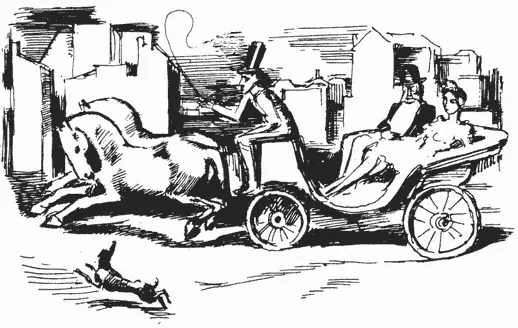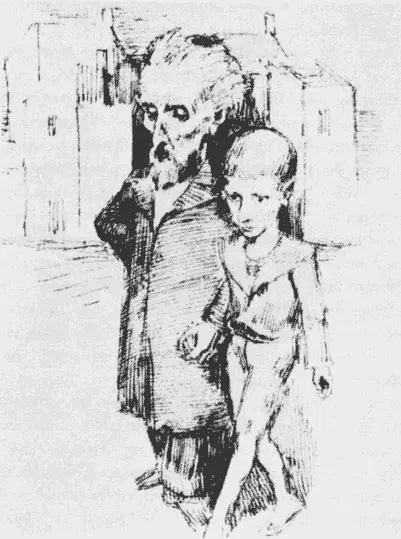How can you plead innocence, how can you resist when you yourself have been bribed, outvoted, and betrayed by your most loyal allies. The six days of Creation were divine and bright. But on the seventh day God broke down. On the seventh day he felt an unknown texture under his fingers, and frightened, he withdrew his hands from the world, although his creative fervor might have lasted for many more days and nights. Oh, Joseph, beware the seventh day. ..."
And lifting up with awe Adela's slim shoe, he spoke as if seduced by the lustrous eloquence of that empty shell of patent leather:
"Do you understand the horrible cynicism of this symbol on a woman's foot, the provocation of her licentious walk on such elaborate heels? How can I leave you under the sway of that symbol? God forbid that I should do it. ..."
Saying this, his skillful fingers stuffed Adela's shoes, dress, and beads into his pocket.
"What are you doing, Shloma?"
But he was already moving quickly toward the door, limping slightly, his checked trousers flapping round his legs. In the doorway he turned his gray, already indistinct face toward me and lifted his hand in a reassuring gesture. And then he was gone.
SPRING
I
THIS IS THE STORY of a certain spring that was more real, more dazzling and brighter than any other spring, a spring that took its text seriously: an inspired script, written in the festive red of sealing wax and of calendar print, the red of colored pencils and of enthusiasm, the amaranth of happy telegrams from far away . . .
Each spring begins like this, with stunning horoscopes reaching beyond the expectations of a single season. In each spring there is everything: processions and manifestations, revolutions and barricades. Each brings with it, at a given moment, the hot wind of frenzy, an infinity of sadnesses and delights that seek in vain their equivalents in reality.
Later on, these exaggerations, culminations, and ecstasies are transformed into blossoming, into the trembling of cool leaves, and are absorbed by the tumultuous rustling of gardens. In this way springs betray their promise; each of them, engrossed in the breathless murmur of flowering parks, forgets its pledges and sheds, one by one, the leaves of its testament.
But that particular spring had the courage to endure, to keep its promise and bond. After many unsuccessful efforts, it succeeded in acquiring a permanent shape and burst upon the world as the ultimate all-embracing spring.
Oh that wind of events, that hurricane of happenings: the successful coups d'état, those gradiose, triumphant, highfalutin' days! How I wish that the pace of this story would catch their entrancing, inspired beat, the heroic tone of that epic, the marching rhythm of that springlike "Marseillaise"!

How boundless is the horoscope of spring! One can read it in a thousand different ways, interpret it blindly, spell it out at will, happy to be able to decipher anything at all amid the misleading divinations of birds. The text can be read forward or backward, lose its sense and find it again in many versions, in a thousand alternatives. Because the text of spring is marked by hints, ellipses, lines dotted on an empty azure, and because the gaps between the syllables are filled by the frivolous guesses and surmises of birds, my story, like that text, will follow many different tracks and will be punctuated by springlike dashes, sighs, and dots.
II
During those wild spacious nights that preceded the spring, when the sky was vast, still raw and unscented, and aerial byways led into the starry infinite, my father sometimes took me out to supper in a small garden restaurant hidden between the back walls of the farthest houses of the market square.
We walked in the damp light of streetlamps hissing in the wind, cutting across the large expanse of the square, forlorn, crushed by the immensity of the sky, lost and disoriented by its empty vastness. My father lifted his face bathed in the scanty light and looked anxiously at the starry grit scattered among the shallows of heavenly eddies. Their irregular and countless agglomerations were not yet ordered into constellations, and no figures emerged from the sterile pools. The sadness of the starlit space lay heavily over the town, the lamps pierced the night below with beams of light, tying them haphazardly into knots. Under these lamps, passers-by stopped in groups of two or three in the circle of light, which for a short moment looked like the glow of a lamp over a dining table, although the night was indifferent and unfriendly, dividing the sky into wild airscapes, exposed to the blows of a homeless wind. Conversations faltered; under the deep shadow of their hats people smiled with their eyes and listened dreamily to the distant hum of the stars.

The paths in the restaurant garden were covered with gravel. Two standard lamps hissed gently. Gentlemen in black frock coats sat in twos or threes at tables covered with white cloths, looking dully at the polished plates. Sitting thus, they calculated mentally the moves on the great chessboard of the sky, each seeing with his mind's eye the jumping knights and lost pawns of which new constellations immediately took the place.
Musicians on the rostrum dipped their mustaches in mugs of bitter beer and sat around idly, deep in thought. Their violins and nobly shaped cellos lay neglected under the voiceless downpour of the stars. From time to time one of them would reach for his instrument and try it, tuning it plaintively to harmonize with his discreet coughing. Then he would put it aside as if it were not yet ready, not yet measuring up to the night, which flowed along unheeding. And then, as the knives and forks began to clank softly above the white tablecloths, the violins would rise alone, now suddenly mature although tentative and unsure just a short while before; slim and narrow-waisted, they eloquently proceeded with their task, took up again the lost human cause, and pleaded before the indifferent tribunal of stars, now set in a sky on which the shapes of the instruments floated like water signs or fragments of keys, unfinished lyres or swans, an imitatory, thoughtless starry commentary on the margin of music.
The town photographer, who had for some time been casting meaningful glances at us from a neighboring table, joined us at last and sat down, putting his mug of beer on the table. He smiled equivocally, fought with his own thoughts, snapped his fingers, losing again and again some elusive point.
1 comment